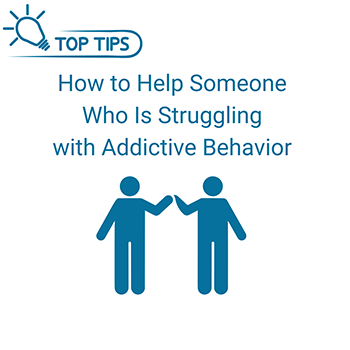5 Tips: How to Help Someone Who is Struggling with Addictive Behavior
It is both heartbreaking and incredibly frustrating when you love someone who is struggling with addiction. It is also confusing as heck to navigate how you might help them. As an addiction specialist for thirteen years, I have been working with clients who love people who are struggling with addictive behavior, and these are my top 5 tips that I strongly recommend.

Tip #1: Educate yourself on addiction
Educate yourself on addiction. Learn how the brain gets hijacked, learn about how addiction impacts memory and impulse control. The addiction is one part of the person you love, and that “part” is progressively taking over the other parts over time. Get mad at the addiction—not at the whole person.
Tip #2: Stop smoking the HOPE-IUM
Stop smoking the HOPE-IUM (get it—like opium but with Hope). Learn to distinguish between Real Hope and False Hope (denial). Your loved one with addiction is smoking the HOPE-IUM when they are repeating the same pattern over and over, “hoping” that it will be different.
You can get stuck in this pattern as well. Real Hope comes when there is evidence—real evidence—of change happening.
Real Hope is NOT:
—Last week he only had a few drinks so maybe that will stick.
—Once she gets a better position at work, she will stop using like she has been.
When you believe a pattern of addiction will change without any real work, this is a signal that you are hooked on HOPE-IUM—false hope—and this is also addictive.
Real Hope IS:
—He is depressed after getting a DUI and has shared with me that he doesn't know how to stop—but he is looking into detox programs.
—Even though she hasn't quit drinking, she got a therapist on her own to explore where her anxiety is coming from.
—I can get more peace back into my life. I don’t have to live in a near-constant state of stress and obsession around my loved one’s addiction—if I get support and set boundaries with love.
Tip #3: Learn where you are protecting their addiction
Learn where you are protecting their addiction (also called enabling) and where you can actually support change. It's common for loved ones of people struggling with addictions to try and protect them from harm. We love them; it makes sense. But—by doing this time and time again, we are also protecting the addiction itself from having to face itself, and having to face real consequences that are necessary for change to occur. We may be covering up for someone so they do not lose their job, license, relationship, etc. We may be giving them a place to live without having to keep a job and, in turn, pay rent. We may be avoiding the topic altogether because it would anger them, or embarrass them.
Supporting change may look like:
—listening without trying to fix things
—driving them to a recovery meeting
—and following the rest of these Tips.
Ask yourself: Am I supporting recovery and change, or am I protecting the addictive pattern?
Tip #4: Set boundaries with love
Set boundaries, and do so with the language of kindness and love. Learn about your needs, what you need to do to get healthier yourself, and set boundaries that you will actually keep (start small). Learn to detach from their ups and downs from more of a distance and with loving communication. Sometimes this means, “We will not continue to pay for college unless you are invested in a recovery program,” or “I will no longer go out to dinner with you if you are drinking.” Sometimes this means “I love you, but I am moving out because this situation has become too dangerous for my own mental health.”
*THIS IS NO EASY TASK. Setting boundaries while aiding in possibilities for recovery can also mean more risk, so the last tip (#5) might be the most important tip you can take to heart.
Tip #5: Get your own support
Get your own support from a therapist who specializes in addiction AND go to support groups like ALANON or LEARN TO COPE meetings.
Your commitment to this tip is crucial. The rest of the Tips here are too difficult to reasonably suggest that you should learn and practice them on your own.
A Note about Abstaining in Front of Your Loved One
In the early stages of their recovery, do choose to abstain from using their drug of choice in front of them. They might say, It's fine—you can drink, don't change for me. Don't do it anyway. Do not invite their worst enemy over for dinner. Recovery is a huge deal, and it warrants this kind of support. If the person you love maintains recovery, then yes, someday once they’ve built a foundation of strength, you may be able to have a drink or a smoke in front of them without throwing them off balance. If you find you cannot abstain in front of them, or do not believe that using that substance in front of them is really a problem, it’s time to consider your own relationship with that substance and how it might be getting in the way of helping you support your loved one with addiction.
In summary, it can take years upon years for someone to decide they are ready to change—and they may never change. It's important to understand that freedom from the chaos of someone else's addiction is possible for you, even if they never stop using. Hang in there, follow the tips, and get support.
Written by Lisa "LC" Coppola, LMHC
Boston Post Adoption Resources